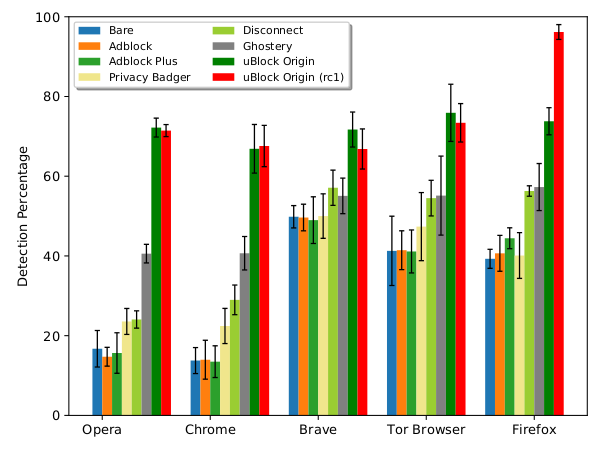-
Notifications
You must be signed in to change notification settings - Fork 83
uBlock Origin works best on Firefox
This document explains why uBO works best in Firefox.
Ability to uncloak 3rd-party servers disguised as 1st-party through CNAME record. The effect of this is to make uBO on Firefox the most efficient at blocking 3rd-party trackers relative to other browser/blocker pairs:

The dark green/red bars are uBO before/after it gained the ability to uncloak CNAMEs on Firefox.
Source: "Characterizing CNAME Cloaking-Based Tracking on the Web" at Asia Pacific Network Information Centre, August 2020.
Since uBO is able to fetch the DNS record related to a specific URL, it can filter according to the IP addresses present in DNS record. See ipaddress=.
HTML filtering is the ability to filter the response body of HTML documents before parsing them by the browser.
For example, this allows the removal of specific tags in HTML documents before they are parsed and executed by the browser, something not possible in a reliable manner in other browsers. This feature requires the webRequest.filterResponseData() API, currently only available in Firefox.
See Implement network filter option replace=.
Firefox will wait for uBO to be ready before sending network requests from already opened tab(s) at browser launch.
In Chromium-based browsers, this is not the case. Tracker/advertisement payloads may find their way into already opened tabs before uBO is ready, while Firefox will properly filter these.
Reliably blocking at browser launch is especially important for whoever uses default-deny mode for 3rd-party resources or JavaScript.
A setting is available, disabled by default, to mitigate this issue in Chromium-based browsers. This setting does not cover 100% of all use cases, and some exceptions may apply.
Also see related discussion: Blocking "early" requests is not possible
Pre-fetching, disabled by default in uBO, is reliably prevented in Firefox, while this is not the case in Chromium-based browsers.
Chromium-based browsers give precedence to websites over user settings when it comes to deciding whether pre-fetching is disabled or not.
Reference: Disable prefetching
The Firefox version of uBO uses WebAssembly code for core filtering code paths. With Chromium-based browsers, this is not the case because this would require an extra permission in the extension manifest that could cause friction when publishing the extension in the Chrome Web Store.
More Information: https://github.com/WebAssembly/content-security-policy/issues/7#issuecomment-441259729
The Firefox version of uBO uses LZ4 compression by default to store raw filter lists, compiled list data, and memory snapshots to disk storage.
LZ4 compression requires the use of IndexedDB, which is problematic with Chromium-based browsers in the incognito mode where instances of IndexedDB get reset, causing uBO to launch inefficiently and with out-of-date filter lists (see #399). IndexedDB is required because it supports storing Blob-based data, a capability unavailable to browser.storage.local API.
uBlock Origin - An efficient blocker for Chromium and Firefox. Fast and lean.
- Wiki home
- About the Wiki documentation
- Permissions
- Privacy policy
- Info:
- The toolbar icon
- The popup user interface
- The context menu
-
Dashboard
- Settings pane
- Filter lists pane
- My filters pane
- My rules pane
- Trusted sites pane
- Support
- Keyboard shortcuts
- The logger
- Element picker
- Element zapper
-
Blocking mode
- Very easy mode
- Easy mode (default)
- Medium mode (optimal for advanced users)
- Hard mode
- Nightmare mode
- Strict blocking
- Few words about re-design of uBO's user interface
- Reference answers to various topics seen in the wild
- Overview of uBlock's network filtering engine
- uBlock's blocking and protection effectiveness:
- uBlock's resource usage and efficiency:
- Memory footprint: what happens inside uBlock after installation
- uBlock vs. ABP: efficiency compared
- Counterpoint: Who cares about efficiency, I have 8 GB RAM and|or a quad core CPU
- Debunking "uBlock Origin is less efficient than Adguard" claims
- Myth: uBlock consumes over 80MB
- Myth: uBlock is just slightly less resource intensive than Adblock Plus
- Myth: uBlock consumes several or several dozen GB of RAM
- Various videos showing side by side comparison of the load speed of complex sites
- Own memory usage: benchmarks over time
- Contributed memory usage: benchmarks over time
- Can uBO crash a browser?
- Tools, tests
- Deploying uBlock Origin
- Proposal for integration/unit testing
- uBlock Origin Core (Node.js):
- Troubleshooting:
- Good external guides:
- Scientific papers